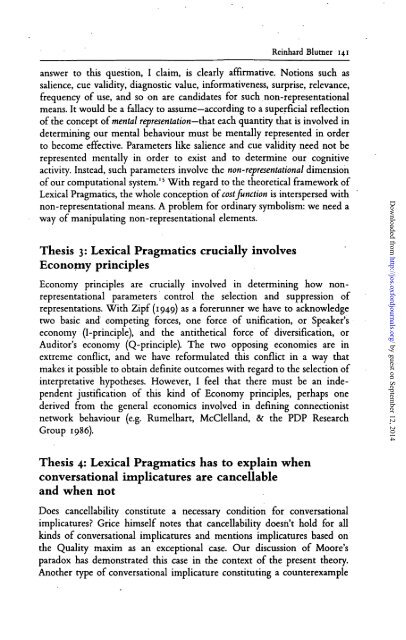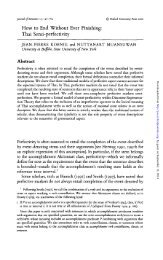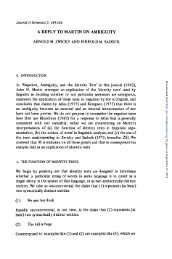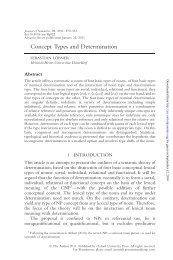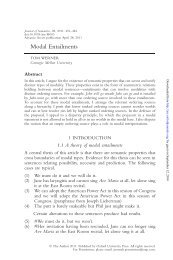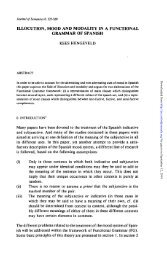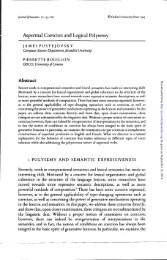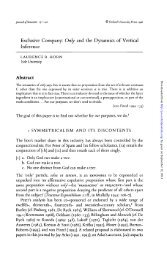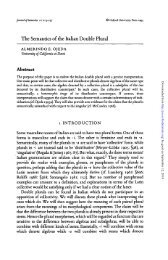Lexical Pragmatics - Journal of Semantics
Lexical Pragmatics - Journal of Semantics
Lexical Pragmatics - Journal of Semantics
Create successful ePaper yourself
Turn your PDF publications into a flip-book with our unique Google optimized e-Paper software.
Reinhard Blutner 141answer to this question, I claim, is clearly affirmative. Notions such assalience, cue validity, diagnostic value, informativeness, surprise, relevance,frequency <strong>of</strong> use, and so on are candidates for such non-representationalmeans. It would be a fallacy to assume—according to a superficial reflection<strong>of</strong> the concept <strong>of</strong> mental representation—that each quantity that is involved indetermining our mental behaviour must be mentally represented in orderto become effective. Parameters like salience and cue validity need not berepresented mentally in order to exist and to determine our cognitiveactivity. Instead, such parameters involve the non-representational dimension<strong>of</strong> our computational system. IS With regard to the theoretical framework <strong>of</strong><strong>Lexical</strong> <strong>Pragmatics</strong>, the whole conception <strong>of</strong>cost function is interspersed withnon-representational means. A problem for ordinary symbolism: we need away <strong>of</strong> manipulating non-representational elements.Thesis 3: <strong>Lexical</strong> <strong>Pragmatics</strong> crucially involvesEconomy principlesEconomy principles are crucially involved in determining how nonrepresentationalparameters control the selection and suppression <strong>of</strong>representations. With Zipf (1949) as a forerunner we have to acknowledgetwo basic and competing forces, one force <strong>of</strong> unification, or Speaker'seconomy (I-principle), and the antithetical force <strong>of</strong> diversification, orAuditor's economy (Q-principle). The two opposing economies are inextreme conflict, and we have reformulated this conflict in a way thatmakes it possible to obtain definite outcomes with regard to the selection <strong>of</strong>interpretative hypotheses. However, I feel that there must be an independentjustification <strong>of</strong> this kind <strong>of</strong> Economy principles, perhaps onederived from the general economics involved in defining connectionistnetwork behaviour (e.g. Rumelhart, McClelland, & the PDP ResearchGroup 1986).Downloaded from http://jos.oxfordjournals.org/ by guest on September 12, 2014Thesis 4: <strong>Lexical</strong> <strong>Pragmatics</strong> has to explain whenconversational implicatures are cancellableand when notDoes cancellability constitute a necessary condition for conversationalimplicatures? Grice himself notes that cancellability doesn't hold for allkinds <strong>of</strong> conversational implicatures and mentions implicatures based onthe Quality maxim as an exceptional case. Our discussion <strong>of</strong> Moore'sparadox has demonstrated this case in the context <strong>of</strong> the present theory.Another type <strong>of</strong> conversational implicature constituting a counterexample


